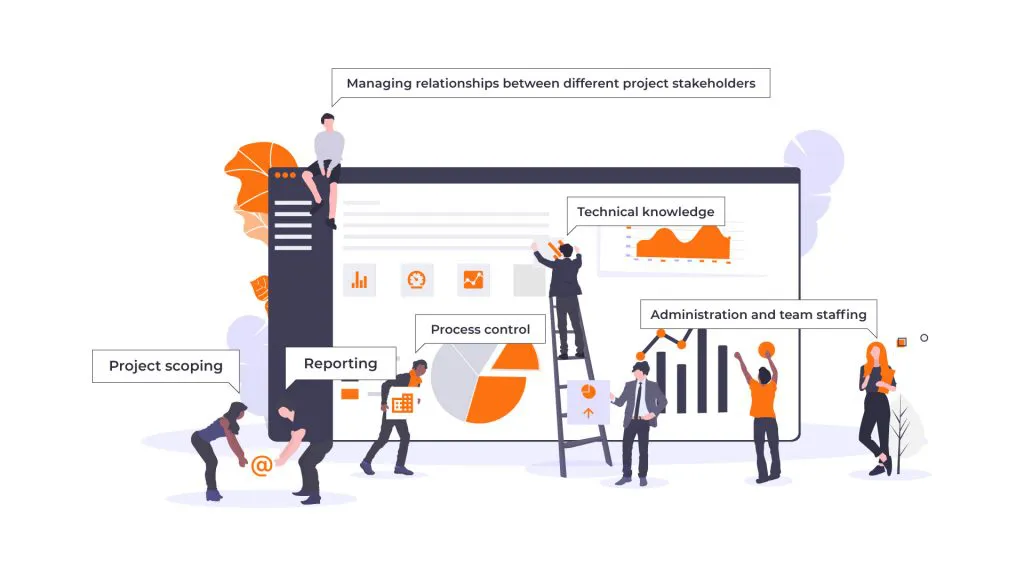
Sunscrapers Team
14 January 2020, 12 min read

What's inside
- What is the role of a software development manager? Responsibilities and duties
- What are the required skills to manage a team of software developers?
- How to manage software developers – 8 useful tips
- The key to managing software development teams
A development team will have a hard time shipping a successful product without proper guidance, even with the best skills and expertise on board. That's why the role of a team manager is so critical to building digital products that make a splash on the market and drive business growth.
At Sunscrapers, we provide our development teams with guidance from experienced and skilled managers who know the ins and outs of building digital products, even if they can't write code themselves.
It's possible to manage a development team successfully without being a technical person. Managers don't need to know how to write code. That's the job of developers. Instead, they need to know what the process of developing software looks like and implement its best practices, all the while taking care of the team.
Read this article to find out more about the role of a software team manager, as well as the critical skills and responsibilities of successful managers. At the end of the article, we share some useful tips for managing teams based on the experience we acquired throughout the years on the market.
What is the role of a software development manager? Responsibilities and duties
There's no denying that the role of a manager is a complex one. Successful managers who do their job right make everything work smoothly in the project, ensuring that all the work gets done on schedule and that all the project stakeholders get what they want.
Here are a few key responsibilities and duties of a software development team manager.

There's no denying that the role of a manager is a complex one. Successful managers who do their job right make everything work smoothly in the project, ensuring that all the work gets done on schedule and that all the project stakeholders get what they want.
Here are a few key responsibilities and duties of a software development team manager.
1. Project scoping
Managers need to know how to scope out a project, respond to a Request for Proposal, and deliver a document that features all the deliverables, timelines, budgets, and roadmaps (the so-called project scope document). These tasks are linked to typical project management responsibilities, but the manager's role is distinct from that of project management.
Note: If a development team follows one of the agile development methodologies (like Scrum), the project scope document will be flexible. The manager will be responsible for maintaining and regularly updating as the project progresses.
2. Managing relationships between different project stakeholders
Another key area of responsibility is managing the relationships with all the people involved in the project. It's important to ensure that everyone is in the loop and gets regular status updates. Smart managers implement various time tracking and project management tools that provide transparency and visibility into what the team is up to. They also ensure that the communication flow is uninterrupted, and all the project requirements are prioritized correctly based on the customer's business objectives.
Here's how we achieve that type of alignment in our daily work with clients from all over the world: Outsourcing best practices: 6 tips for coordinating internal and external development
3. Process control
Managers act as process guardians. Their key job is to ensure that the team follows the process and doesn't encounter any roadblocks on the way to completing tasks.
Approaches to developing software like agile provide teams and managers with opportunities to reflect on their process and optimize it with the unique project requirements in mind. There are no perfect systems, so it's important always to keep looking for ways to improve the team processes, especially in outsourcing scenarios like the dedicated team model.
Kamil Sabatowski, former COO at Sunscrapers
4. Reporting
The manager is also responsible for reporting the project status to different project stakeholders. Such reports need to be based on solid metrics; team managers have to come up with a way of measuring progress and summarizing it so that it's meaningful to stakeholders. It's best to agree on the format, frequency, and content of such reports before the project begins.
5. Technical knowledge
This one is tricky. The person responsible for managing the team doesn't need to be a tech guru. This area of expertise is best left to senior developers. However, successful managers usually feel comfortable in the tech world and are aware of the latest technology trends. But most importantly, they need a firm grasp of how software is developed and what the current best practices are. Managers also need to know enough about the tools their team is using and be aware of the gaps in the team's knowledge. Ultimately, a manager needs to keep the big picture in mind and focus on delivering value.
6. Administration and team staffing
Finally, there are administrative and team staffing functions. Hiring and firing team members, managing budgets and timelines, competing for resources, accounting – all of these things may become part of the manager's job depending on the company's organization and internal resources.
Team staffing is more important than it appears. By having the right team members assigned to the right roles, managers make sure that they have all the expertise on board required to deliver the project successfully. Also, smart managers never have anyone everyone working at 100% capacity. By allowing for some space and adding people to their teams, they can quickly respond to sudden extra demands without putting the project at risk.
Kamil Sabatowski, former COO at Sunscrapers
What are the required skills to manage a team of software developers?
Leadership is critical to the success of a software development project. While self-organizing teams are a dream come true of agile followers, a skilled team leader is invaluable in guiding the team to success.
Here are the skills required for managing software developers successfully:
- Team building – a team that works well together will be more efficient than a group of developers that don't know how to collaborate, even if every single one of them is a brilliant expert. Making the team work together smoothly requires a wide range of skills that focus on the understanding of people and their strengths or motivations. This skill is particularly important in the extended team scenario, where the manager's job is combining the activities of two teams often separated by different locations and time zones.
- Task delegation – delegating tasks to the right people is an important team management skill, especially in remote team cooperation. It requires a good understanding of individual strengths and weaknesses of each developer. Managers need to be able to recognize these abilities and assign tasks according to them to increase productivity and confidence within the team.
Note: Once a team matures and its members learn how to cooperate with each other, the manager can gradually withdraw from delegating tasks in many areas. That will depend on the team's maturity, its understanding of agile, the competencies and personal characteristics of individual team members (and other factors that bring about self-organizing agile teams).
- Autonomy and empowerment – in most software development environments, teams follow agile methodologies.
In agile environments, managers provide developers with a clear goal and allow the team to find the best way to achieve it. Granting a degree of autonomy to the team makes its members more engaged because they feel like they're in control of their time and work. It also inspired trust.
Kamil Sabatowski, former COO at Sunscrapers
- Problem-solving – another key responsibility of managers is minimizing the number of problems and solving issues before they become serious blockers. That's why successful leaders need to have solid problem-solving skills to develop a process for their team that helps to come up with solutions.
- Integrity – people who manage software teams need to show a consistency of the values, methods, expectations, and actions. This is how they demonstrate a commitment to the project and inspire team members to follow these values and best practices.
How to manage software developers – 8 useful tips
1. Understand the strengths and weaknesses of your team
Software development projects are complicated and require a variety of different skills and capabilities. It's impossible to find a developer who is an expert in all technical areas. That's why you need to know who is the best person to perform a certain task. Sometimes it even makes sense to divide tasks into subtasks and then delegate them to different people.
The goal here is delivering an effective overall result and taking advantage of your resources wisely. Remember – just because a developer has no experience with something, it doesn't mean that they can't start working with quickly, as soon as they learn or adapt their skills. The ability of quick learning is often more important than the existing knowledge because the tech world changes so fast, and new technologies emerge all the time.
Kamil Sabatowski, former COO at Sunscrapers
2. Master communication
As a manager, you need to understand the ongoing status and progress of your project. That's why it's so important that you practice active listening – that's how you can better understand the comments, inquiries, and feedback of your team. Always circle back to them with your follow-up questions, especially ones focusing on potential process improvements.
Proactive communication helps a lot. Check in with team leads on a regular basis and organize short meetings with the entire team – following the Scrum framework, for example. By opening the lines of communication, you will let your team know that they can approach you with problems that could otherwise go unsaid and then explode as real issues later on.
3. Plan and document requirements
Trying to develop software without any form of requirements in place is next to impossible. The problem with software requirements is that they can be ambiguous, complicated, and hard to pinpoint.
At Sunscrapers, we sometimes receive projects where the requirements are over-scoped or underwritten.
The key here is finding the balance between the two. Software development teams that follow the agile approach know that requirements will change, and the documentation needs to give space for these alterations. But that doesn't mean you should start your project without any requirements. No matter your approach, plan, and document your requirements with this balance in mind.
4. Be the process guardian
Find the right balance between order and chaos in your software team. In other words, you need to inject only enough process so that developers aren't overwhelmed by it. If you introduce too many procedures, your team will progress slowly. Too much disorder doesn't allow teams to progress either.
Start with presenting a minimal amount of procedure in your process. For example, you should avoid developing a complex process for testing, reporting, tracking, resolving, retesting, and confirming bugs. This procedure will scare developers and make them less motivated in their work. Instead, they aim to introduce a few procedures as possible for accomplishing the task at hand.
5. Don't change tasks in progress
If you assign a certain task to a team member, avoid altering it unless it's absolutely necessary because of a sudden change in the market or the client's business. Introducing mid-development changes is a poor managerial practice and impact the entire process of developing software. They also affect team morale and productivity negatively, so think twice before changing tasks.
6. Build a strategy early on
Plan the project before the actual work begins. A plan like that will help developers to keep their eye on the ultimate objective. That's why it's smart to develop a strategy early on for how you're going to encourage every single person in your team to stick to the established plan. Naturally, your strategy should be flexible and accommodate any problems that arise on the way. By sticking to the broadly-defined plan, you'll be able to manage the expectations of all project stakeholders, including the development team.
7. Choose quality instead of quantity
Managing a development team may look differently depending on the manager's experience. Inexperienced managers often believe that including more developers in the project will increase the team's overall productivity. However, this practice rarely brings such results.
Why is that? A new developer might slow down the development until they get up to speed on the project. Onboarding and training take time – and experienced managers know that.
That's why they do something else to improve their team's productivity: they focus on quality instead of quantity and reorganize their team to perform tasks effectively. Here's how:
- Divide larger tasks into subtasks.
- Start with smaller tasks that can be completed within a few days or weeks.
- Assign specific developers to these tasks according to their skills.
- Make sure to developers and in your team represent a variety of experience levels, including both talented junior developers and experienced senior engineers.
- Plan disruptive periods during the day when developers make himself available to talk with managers and respond to emails.
- Make sure that developers get some downtime. Rest and relaxation are important to their productivity.
8. Track the right metrics
To facilitate the process of reporting your team's progress, you need to track the right metrics. Performance reviews offer the best opportunity to measure the performance of an individual team member and identify potential problems.
Make sure to select only the metrics that are applicable to your case instead of collecting all the available metrics just to make your reports more detailed. Also, ask the developer about the problems they notice in the projects and listen to their suggestions about the metrics that would best reflect the actual project status.
Kamil Sabatowski, former COO at Sunscrapers
The key to managing software development teams
We hope these team management tips will help you guide developers throughout the project to ensure its successful delivery. Remember that process optimization and improvement is critical in the context of software development, where technology trends change at the speed of light.
Are you looking to hire a development team? Get in touch with us.
We support companies with a wide range of collaboration models to provide the resources they need for growth – and that includes the support of talented team managers.


